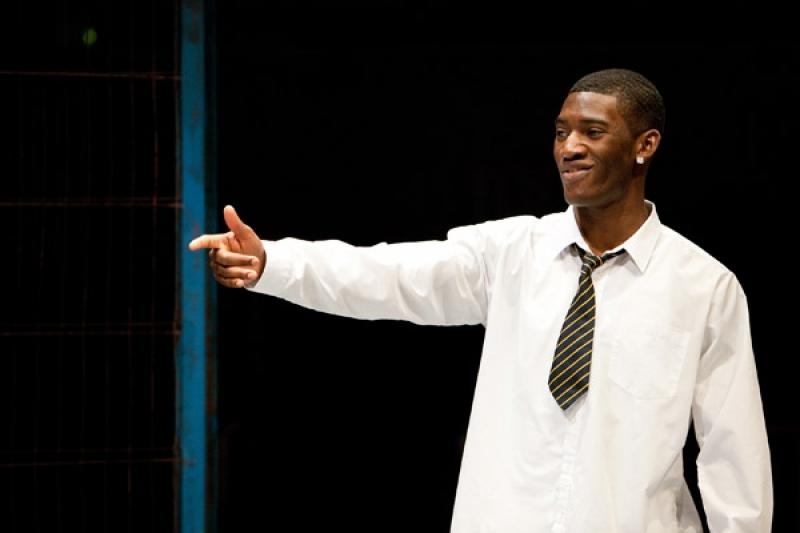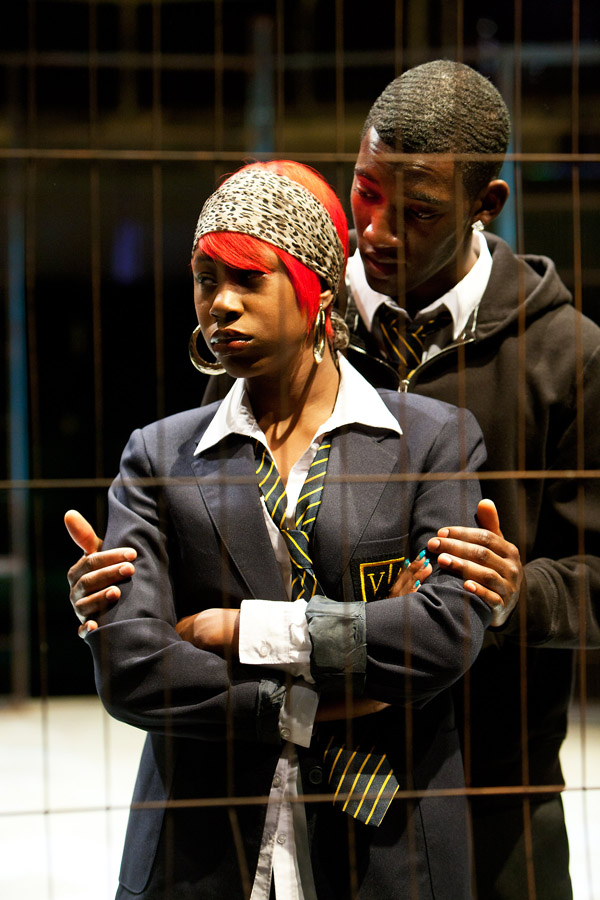Mogadishu, Lyric Hammersmith | reviews, news & interviews
Mogadishu, Lyric Hammersmith
Mogadishu, Lyric Hammersmith
Vivienne Franzmann’s award-winning new play mixes fun with intensity

Recently, some British playwrights have gone back to school, and found that it feels very much like a war zone. All the old tensions between teachers and pupils have escalated into open conflict: knives are drawn, punches thrown and arguments are settled by fights. Likewise, the language is disrespectful at best, and always expletive-heavy.
Like John Donnelly’s The Knowledge and Steve Waters’s Little Platoons, Mogadishu portrays the current state education system as a violent and racist training ground for life. It starts with a playground fracas in which Jason, a black 15-year-old, pushes Amanda, a white teacher, to the ground. When she reluctantly reports him to the head, Chris, Jason accuses her of racism - and bullies his peers into backing up his story. He even gets help from Ben, his father. To the dismay of Amanda, and of her young daughter Becky, and of her black husband Peter, it is she who is disciplined.
The story is told with a strong taste for irony. At first, Amanda wants to protect Jason - she sees this angry young lad as a troubled youth, not as a thug. But Peter knows better: in one of several passionate exchanges in the play, he lashes out at her middle-class liberal sensibilities. Similarly, Becky, who goes to the same school, knows much more about Jason and his bad-boy crew than her mother. Ironically, Ben’s stout defence of his son turns out to be the catalyst for the tragic climax.
Matthew Dunster’s production, with Tom Scutt’s wire-fenced set, conveys the sense of a world of caged lives. In the conflict between good kids and bad kids, and good teachers and bad kids, each side is equally trapped. Mutual incomprehension prevents the truth from coming out; both adults and children inhabit different planets. It feels like the youngsters - even the middle-class ones - are out of control, and that violence is the final arbiter.  Mogadishu is joint winner, with Andrew Sheridan’s Winterlong, of the 2008 Bruntwood Prize for playwriting run by Manchester’s Royal Exchange Theatre, and it is a very impressive debut. If it has faults, they are the faults of a first play: a tendency to lose focus, and to squander intensity by succumbing to the desire to have some fun. So while Dunster’s direction keeps up the menacing pressure, and delivers a couple of powerful climaxes, it was disappointing to see that Firat, the Turkish boy, was played mainly for laughs.
Mogadishu is joint winner, with Andrew Sheridan’s Winterlong, of the 2008 Bruntwood Prize for playwriting run by Manchester’s Royal Exchange Theatre, and it is a very impressive debut. If it has faults, they are the faults of a first play: a tendency to lose focus, and to squander intensity by succumbing to the desire to have some fun. So while Dunster’s direction keeps up the menacing pressure, and delivers a couple of powerful climaxes, it was disappointing to see that Firat, the Turkish boy, was played mainly for laughs.
The skill of Franzmann’s play lies in its shifting perspectives on Jason, the king of a petty playground gang: in one scene you hate him; the next you admire him; then you suddenly sympathise; then you recoil; then his fate cuts you to the quick. And although he is a bit of a cipher in the first act, Malachi Kirby plays him with impressive, and growing, power and vigour. Similarly, Julia Ford’s Amanda makes the journey from wet liberalism to raging fury with complete conviction. Of the remaining cast members, who are all vividly memorable, Savannah Gordon-Liburd as Dee (pictured above right with Kirby), Jason’s girlfriend, conveys a real sense of an uneasy conscience. At its best, Mogadishu burns bright as a vivid picture of generational and class war. It is also guaranteed to cure you of any lingering nostalgia for school days.
- Mogadishu is at the Lyric Hammersmith, London, until 2 April
- The Lyric Hammersmith’s website
 Find Mogadishu on Amazon
Find Mogadishu on Amazon
Share this article
The future of Arts Journalism
You can stop theartsdesk.com closing!
We urgently need financing to survive. Our fundraising drive has thus far raised £49,000 but we need to reach £100,000 or we will be forced to close. Please contribute here: https://gofund.me/c3f6033d
And if you can forward this information to anyone who might assist, we’d be grateful.

Subscribe to theartsdesk.com
Thank you for continuing to read our work on theartsdesk.com. For unlimited access to every article in its entirety, including our archive of more than 15,000 pieces, we're asking for £5 per month or £40 per year. We feel it's a very good deal, and hope you do too.
To take a subscription now simply click here.
And if you're looking for that extra gift for a friend or family member, why not treat them to a theartsdesk.com gift subscription?
more Theatre
 The Weir, Harold Pinter Theatre review - evasive fantasy, bleak truth and possible community
Three outstanding performances in Conor McPherson’s atmospheric five-hander
The Weir, Harold Pinter Theatre review - evasive fantasy, bleak truth and possible community
Three outstanding performances in Conor McPherson’s atmospheric five-hander
 Dracula, Lyric Hammersmith review - hit-and-miss recasting of the familiar story as feminist diatribe
Morgan Lloyd Malcolm's version puts Mina Harkness centre-stage
Dracula, Lyric Hammersmith review - hit-and-miss recasting of the familiar story as feminist diatribe
Morgan Lloyd Malcolm's version puts Mina Harkness centre-stage
 The Code, Southwark Playhouse Elephant review - superbly cast, resonant play about the price of fame in Hollywood
Tracie Bennett is outstanding as a ribald, riotous Tallulah Bankhead
The Code, Southwark Playhouse Elephant review - superbly cast, resonant play about the price of fame in Hollywood
Tracie Bennett is outstanding as a ribald, riotous Tallulah Bankhead
 Reunion, Kiln Theatre review - a stormy night in every sense
Beautifully acted, but desperately grim drama
Reunion, Kiln Theatre review - a stormy night in every sense
Beautifully acted, but desperately grim drama
 The Lady from the Sea, Bridge Theatre review - flashes of brilliance
Simon Stone refashions Ibsen in his own high-octane image
The Lady from the Sea, Bridge Theatre review - flashes of brilliance
Simon Stone refashions Ibsen in his own high-octane image
 Romans: A Novel, Almeida Theatre review - a uniquely extraordinary work
Alice Birch’s wildly epic family drama is both mind-blowing and exasperating
Romans: A Novel, Almeida Theatre review - a uniquely extraordinary work
Alice Birch’s wildly epic family drama is both mind-blowing and exasperating
 The Producers, Garrick Theatre review - Ve haf vays of making you laugh
You probably know what's coming, but it's such great fun!
The Producers, Garrick Theatre review - Ve haf vays of making you laugh
You probably know what's coming, but it's such great fun!
 Not Your Superwoman, Bush Theatre review - powerful tribute to the plight and perseverance of Black women
Golda Rosheuvel and Letitia Wright excel in a super new play
Not Your Superwoman, Bush Theatre review - powerful tribute to the plight and perseverance of Black women
Golda Rosheuvel and Letitia Wright excel in a super new play
 Cow | Deer, Royal Court review - paradox-rich account of non-human life
Experimental work about nature led by Katie Mitchell is both extraordinary and banal
Cow | Deer, Royal Court review - paradox-rich account of non-human life
Experimental work about nature led by Katie Mitchell is both extraordinary and banal
 Deaf Republic, Royal Court review - beautiful images, shame about the words
Staging of Ukrainian-American Ilya Kaminsky’s anti-war poems is too meta-theatrical
Deaf Republic, Royal Court review - beautiful images, shame about the words
Staging of Ukrainian-American Ilya Kaminsky’s anti-war poems is too meta-theatrical
 Laura Benanti: Nobody Cares, Underbelly Boulevard Soho review - Tony winner makes charming, cheeky London debut
Broadway's acclaimed Cinderella, Louise, and Amalia reaches Soho for a welcome one-night stand
Laura Benanti: Nobody Cares, Underbelly Boulevard Soho review - Tony winner makes charming, cheeky London debut
Broadway's acclaimed Cinderella, Louise, and Amalia reaches Soho for a welcome one-night stand
 The Pitchfork Disney, King's Head Theatre review - blazing with dark energy
Thrilling revival of Philip Ridley’s cult classic confirms its legendary status
The Pitchfork Disney, King's Head Theatre review - blazing with dark energy
Thrilling revival of Philip Ridley’s cult classic confirms its legendary status

Add comment